Related Research Articles

Citizen Kane is a 1941 American drama film directed by, produced by, and starring Orson Welles. Welles and Herman J. Mankiewicz wrote the screenplay. The picture was Welles's first feature film.

George Orson Welles was an American director, actor, writer, and producer who is remembered for his innovative work in film, radio, and theatre. He is considered to be among the greatest and most influential filmmakers of all time.

Laurence Harvey was a Lithuanian-born actor. He was born to Lithuanian Jewish parents and emigrated to South Africa at an early age, before later settling in the United Kingdom after World War II. In a career that spanned a quarter of a century, Harvey appeared in stage, film and television productions primarily in the United Kingdom and the United States.
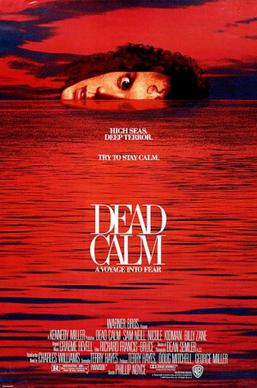
Dead Calm is a 1989 Australian psychological thriller film directed by Phillip Noyce, produced by George Miller, and starring Sam Neill, Nicole Kidman and Billy Zane. The screenplay by Terry Hayes was based on the 1963 novel of the same name by Charles Williams.

Jeanne Moreau was a French actress, singer, screenwriter, director, and socialite. She made her theatrical debut in 1947, and established herself as one of the leading actresses of the Comédie-Française. Moreau began playing small roles in films in 1949, later achieving prominence with a starring role in Louis Malle's Elevator to the Gallows (1958). She was most prolific during the 1960s, winning the Cannes Film Festival Award for Best Actress for Seven Days... Seven Nights (1960) and the BAFTA Award for Best Foreign Actress for Viva Maria! (1965), with additional prominent roles in La Notte (1961), Jules et Jim (1962), and Le journal d'une femme de chambre (1964).

Michael Dennis Bryant was a British stage and television actor.
Oja Kodar is a Croatian actress, screenwriter and director known as Orson Welles's romantic partner during the later years of his life.
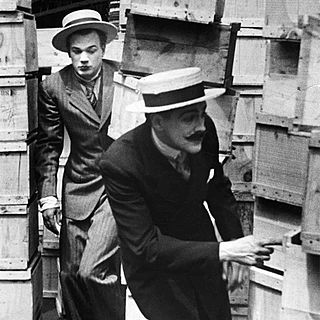
Too Much Johnson is a 1938 American silent comedy film written and directed by Orson Welles. An unfinished film component of a stage production, it was made three years before Welles directed Citizen Kane, but it was never publicly screened. It was shot to be integrated into Welles's Mercury Theatre stage presentation of William Gillette's 1894 comedy, but the film sequences could not be shown due to the absence of projection facilities at the venue, the Stony Creek Theatre in Connecticut. The resulting plot confusion reportedly contributed to the stage production's failure.

Macbeth is a 1948 American historical drama directed by Orson Welles. A film adaptation of William Shakespeare's tragedy of the same name, it tells the story of the Scottish general who becomes the King of Scotland through treachery and murder. The film stars Welles in the lead role and Jeanette Nolan as Lady Macbeth.
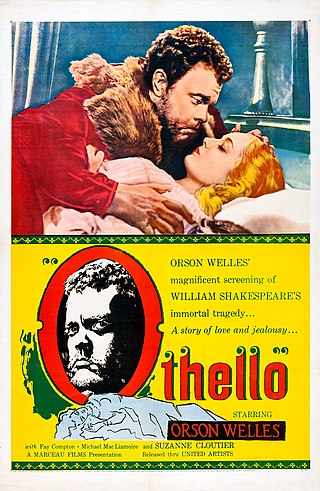
Othello is a 1951 tragedy directed and produced by Orson Welles, who also adapted the Shakespearean play and played the title role. Recipient of the Grand Prix du Festival International du Film at the 1952 Cannes Film Festival, the film was distributed by United Artists when it was released in the United States in 1955. Othello was filmed on location over a three-year period in Morocco, Venice, Tuscany and Rome as well as at the Scalera Studios in Rome.
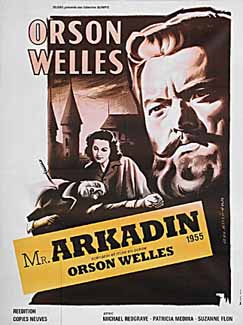
Mr. Arkadin, known in Britain as Confidential Report, is a French-Spanish-Swiss co-production film noir, written and directed by Orson Welles and shot in several Spanish locations, including Costa Brava, Segovia, Valladolid, and Madrid. Filming took place throughout Europe in 1954, and scenes shot outside Spain include locations in London, Munich, Paris, the French Riviera, and at the Château de Chillon in Switzerland.

Chimes at Midnight is a 1966 period comedy-drama film written, directed by, and starring Orson Welles. Its plot centers on William Shakespeare's recurring character Sir John Falstaff and his fatherly relationship with Prince Hal, who must choose loyalty to Falstaff or to his father, King Henry IV. The English-language film was an international co-production of Spain, France, and Switzerland.
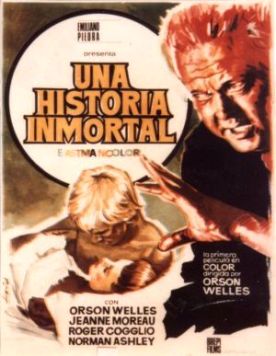
The Immortal Story is a 1968 French film directed by Orson Welles and starring Jeanne Moreau. The film was originally broadcast on French television and was later released in theatres. It was based on a short story by the Danish writer Karen Blixen. With a running time of sixty minutes, it is the shortest feature film directed by Welles.
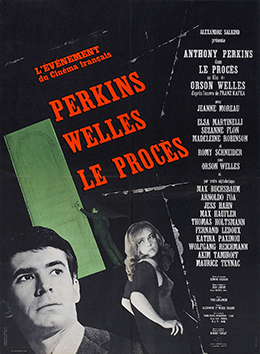
The Trial is a 1962 drama film written and directed by Orson Welles, based on the 1925 posthumously published novel of the same name by Franz Kafka. Welles stated immediately after completing the film: "The Trial is the best film I have ever made". The film begins with Welles narrating Kafka's parable "Before the Law" to pinscreen scenes created by the artists Alexandre Alexeieff and Claire Parker.

The Other Side of the Wind is a satirical drama film co-written, co-edited, and directed by Orson Welles, and posthumously released in 2018 after 48 years in development. The film stars John Huston, Bob Random, Peter Bogdanovich, Susan Strasberg, and Oja Kodar.
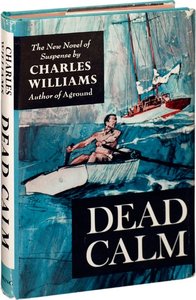
Dead Calm is a 1963 novel by Charles Williams. It was the basis for the unfinished Orson Welles film The Deep, was adapted by Phillip Noyce as the film Dead Calm (1989), and is the sequel to Williams' lesser-known romantic thriller Aground (1960).

Long Live Maria! is a 1965 French/Italian co-production adventure comedy film starring Brigitte Bardot and Jeanne Moreau as two women named Maria who meet and become revolutionaries in the early 20th century. It also starred George Hamilton as Florès, a revolutionary leader. It was co-written and directed by Louis Malle, and filmed in Eastman Color. The costumes were by Pierre Cardin.
The Dreamers is an unfinished film project directed and produced between 1980 and 1982 by Orson Welles. Adapted from Karen Blixen stories, Welles co-wrote a script with his companion Oja Kodar and filmed a few scenes but was unable to complete the film due to financing problems.
Don Quixote is an unfinished film project written, co-produced and directed by Orson Welles. Principal photography took place between 1957 and 1969. Test footage was filmed as early as 1955, second-unit photography was done as late as 1972, and Welles was working on the film intermittently until his death in 1985. The film was eventually edited by Jesús Franco and was released in 1992, to mixed reviews.
The following is a list of unproduced Orson Welles projects in roughly chronological order. During his long career, American actor and filmmaker Orson Welles had worked on a number of projects which never progressed beyond the pre-production stage or were not completed satisfactorily during production. Welles's reliance on self-production meant that many of his later projects were filmed piecemeal or were not completed. Welles financed his later projects through his own fundraising activities. He often also took on other work to obtain money to fund his own films.
References
- 1 2 3 4 5 6 7 8 French, Lawrence (January 27, 2007). "Notes on Orson Welles' THE DEEP". Wellesnet. Retrieved November 10, 2011.
- ↑ "Orson Welles: The Unknown". Harvard Film Archive. 2007.
- ↑ McBride, Joseph (2006). What Ever Happened to Orson Welles? A Portrait of an Independent Career. Lexington, Kentucky: University Press of Kentucky. p. 166.